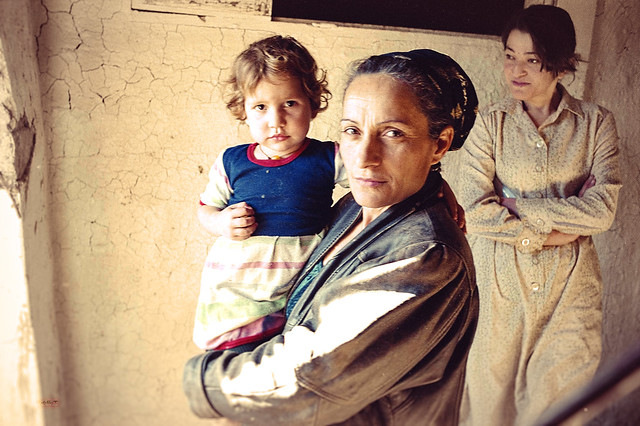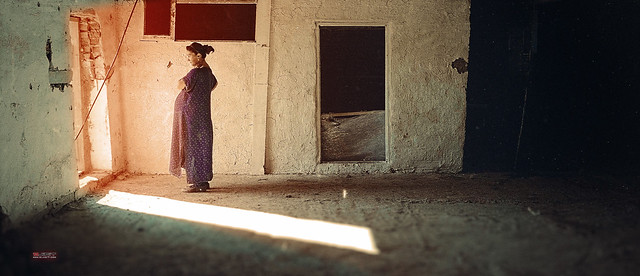source: rfel.org, Humanity in Action, European Commissioner of Human Rights
After the second Chechen war, the number of Chechen refugees in Europe sky-rocketed. Dozens of thousands of Chechens fleeing the war found refuge in Europe. In 2003 a new regulation was introduced by the European Union called Dublin II Regulation, according to which asylum seekers are heavily restricted once they enter European Union’s borders. The regulation forbids them to apply for refugee status in any other country than the first one they entered – which in most cases is a Southern or Eastern European country.
Lack of EU solidarity
Countries situated at the EU border have been flooded by asylum seekers. The repercussions were felt directly by both host countries and by the refugees themselves.
No appropriate financial or material support was offered once the EU countries were given this legal responsibility.

Children play outside an asylum-seekers’ center
Norway was criticized for its abuses during the deportation process – Norway To Asylum Seekers: Go Home.
–
Chechen refugees
There are 2 types of refugees: those who escape oppression and violence and those who seek a better life.
According to international law, a country has the obligation to accept asylum requests when there is proof that a person fears torture or death in their country (war, political oppression etc).
After the end of the second Chechen war, Russia has gone to great lengths to convince the rest of the world that violence has subsided and peace was fully restored in Chechnya. It went as far as trying to convince refugees to return to Chechnya and even blocking the access of those trying to flee.
Read more – Russia blocks Chechen refugees (BBC)
Forced Return of Displaced People to Chechnya (Human Rights Watch)

RUSSIAN FEDERATION: Chechen refugees in a formely chicken factory camp. The conflict in Chechnya has forced some 30,000 people, the majority of them women and children to flee their homes. Many are living in camps that are overcrowded and in sanitary (source: DJIGIT).

RUSSIAN FEDERATION: Chechen refugees in a formely chicken factory camp. The conflict in Chechnya has forced some 30,000 people, the majority of them women and children to flee their homes. Many are living in camps that are overcrowded and in sanitary (source: DJIGIT).
Human Rights organizations have continuously pressed the alarm on human rights violations such as kidnapping (forced disappearances), illegal detention, torture and murder of thousands of civilians since the end of the war.
To read on human rights issues, click the following links
Chechnya today – “worse than war”
Journalism in N. Caucasus – executions and censorship .
–
Photo report on Chechen refugees in Poland
Copyright: Swen Connrad / YumeVision

Chechen woman, use to be a lawyer before, in Chechnya, alone, with her two children, outside the URiC Moszna Center. On the background – the former Moszna Workers’ Hotel, rented by URiC for the Center of Asylum Seekers

URiC (Office for Repatriation and Aliens) Moszna Center, Poland – Chechen woman with the picture of her parents in Chechnya. She paid $ 5000 to liberate her husband from jail. He was killed soon after by Russian army force. She came to Poland pregnant, with 3 children – 8, 10, 14 years old. She lost the fourth one on the way to a safer land. For security reasons, the face of the adult asylum seeker is not shown and the name has been changed. © Swen Connrad / YumeVision

URiC Wola Center in Warsaw, Poland – Chechen man with his sejjadeh (pray carpet), his Muslim rosary and a picture of his four brothers killed by the Russian army. The youngest was 18. Those three objects are the only reminder from Chechnya he managed to save. For security reasons, the face and real name are not shown. © Swen Connrad / YumeVision

Chechen Man with a picture of his house in Grozny, destroyed by Russian bombing in 1999. He succeed to survive 10 years of Chechen war, but in September 2005 Russian forces visited him at his place, threatening him and his family life. They arrived in URiC Wola Center in Warsaw in the mid-October. © Swen Connrad / YumeVision

Chechen Man with his 5-years old daughter. He use to live in the bombed house in Grozny for 6 years together with is wife, daughter and aunt. He succeed to survive over 10 years of Chechen war, but in September 2005 the raids of Russian forces put him on a flight to Poland. They arrived in URiC Wola Center in Warsaw in the middle of October. © Swen Connrad / YumeVision

A mother holding the picture of her husband, killed at the age of 36 by Russian forces. When her oldest son turned 15, she decided to run away in order to protect her family. In Chechnya, boys from the age of 16 disappear daily, detained by Russian forces. © Swen Connrad / YumeVision

Chechen man with a picture of his brother, killed by Russian force at the age of 34. In the background, his daughter in the URiC Radom centre.

Young Chechen boy, praying at the midday Ramadan pray, in the former workers hotel room transformed into a mosque at the URiC Bielany refugee centre

Polish doctor checking a 5 months old chechen baby in the medical clinic of the URiC Bielany Refugee Centre, in Poland

Meeting of Chechens in the Palace of Science and Culture in Warsaw, built at Stalin’s order 50 years ago. The Man talking is Usman Ferzauli, Deputy Foreign Minister of the Chechen Republic of Ichkeria, who lives in exile in Denmark. The man next to him right is Ali Ramzan Ampukayev, Poland Representative of the Chechen Republic of Ichkeria (ChRI). Second from the right is Adam Borowski, the Head of the Poland-Chechnya Committee. Others present are Polish sympathizers, NGO workers, lawyers, journalists. Three portraits of Chechen presidents are standing on the wall: Zelimkhan Yandarbiyev, Dzhokhar Dudayev, Aslan Maskhadov.

A classroom made up of 2 boys and 5 girls who are learning polish language in URiC Radom center.
Piotr Bystrianin, coordinator at the Ocalenie Foundation, a Polish-based nongovernmental organization:
“We are just losing time and money,” he says, “and these people are losing their lives.”
Under the European Union’s Dublin Regulation, the first EU country of entry is responsible for evaluating the claims of an asylum seeker. For Chechens, whose route typically takes them north to Moscow and then west through Belarus, this usually means Poland.
The deportation machine in Europe
The French office of the Education Without Borders Network (Réseau Éducation Sans Frontières) has initiated a petition for the Dzhanaralievs, a Chechen family that is facing deportation from France to Poland, the first EU member country that they entered after fleeing the Russian backed oppression that is rampant in their native Chechnya. France’s decision is in accordance with the Dublin II Regulation, a piece of legislation from 2003 that claims to prevent refugees from being shipped around Europe but in reality, is a protection for EU member states against “asylum shopping.”
According to the EU, the Dublin II Regulation:
establishes the principle that only one Member State is responsible for examining an asylum application. The objective is to avoid asylum seekers from being sent from one country to another, and also to prevent abuse of the system by the submission of several applications for asylum by one person.
The regulation has been criticized, namely by Thomas Hammarberg, the Swedish diplomat and former Commissioner for Human Rights for the Council of Europe in Strasbourg:
This has not been successful in practice. Countries such as Greece and Malta have, during recent years, been unable to provide adequate protection because the numbers of asylum seekers have exceeded their capacity. This is simply not fair and has, in extreme cases, even put lives at risk. It is now high time to revise the Dublin Regulation.
States in northern Europe, far from the borders in the south and the east, have so far not been co-operative in discussions about resolving this mess. In fact, they have not even been willing to use the possibility under the ‘sovereignty clause’ of the present regulation to avoid transfers to Greece, whose asylum system is clearly experiencing a total collapse.
Europe as a whole is not overburdened by asylum applications, at least not in comparison with other parts of the world. In 2009, South Africa alone received almost as many asylum requests as all 27 EU members put together. Some countries in Asia and the Middle East have received even more.
Discrimination
After the Boston Marathon bombings in April, allegedly perpetrated by two ethnic Chechens living in the United States, a rumor spread in the North Caucasus that a fearful Europe would soon shut its doors to Chechens.
While the rumor was unfounded and the borders have not closed, the attacks did focus unwanted attention on the Chechen community.
“Some of our politicians try to connect the question of Chechen refugees to terrorism,” says Bernd Mesovic, deputy managing director of Pro Asyl, a Frankfurt-based NGO that advocates for migrants. “Some of them believe the information given by Russian officials, who are always connecting Chechens with terrorism.”
The same is often true of the German media.
“Terrorists Seek Asylum In Germany” read an August 8 headline in the German daily “Die Welt,” which connected the sudden increase with a call by leading Chechen militant Doku Umarov to plan attacks at next year’s Winter Olympics in Sochi.
Of the applicants in Germany this year, 82 people have been granted refugee status and 702 have been scheduled for deportation. You can’t just leave [Poland for Germany]. OK, you can get there, but then they’ll just deport you back to Poland,” says Imram Shaptukaev a Chechen refugee.

Imran Shaptukaev spent nine months in Germany with his ailing wife before authorities rejected their asylum request
Despite the circumstances, they say the worst-case scenario would be deportation back to Russia.
Seeking a better life
The most difficult thing for Polish authorities is not only having the sole responsibility of dealing with the refugees, but also having to deal with the negative attitude. Discrimination takes place not only from host countries towards refugees but also from refugees towards host countries. Many Chechens are convinced that Dublin II is a simply a Polish concept and that it is Poland which seeks their return from other EU countries. Such misunderstandings, false beliefs and ungrounded suspicions add to tensions between asylum seekers and Polish social welfare staff.
Read more here – For Chechens, Poland is not west enough (UNCHR)
–
Refugees in Austria





















































